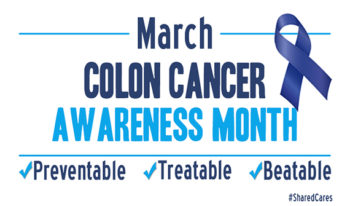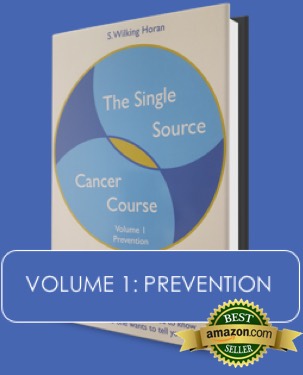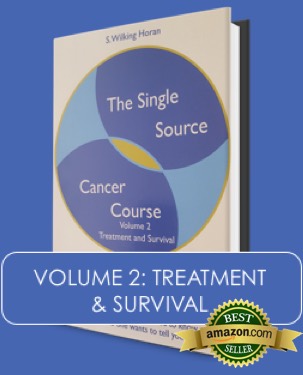 PREVENTABLE, TREATABLE & BEATABLE
PREVENTABLE, TREATABLE & BEATABLE
Hi everyone and Welcome to another FACTUAL FRIDAY. March is COLON CANCER AWARENESS MONTH and, accordingly, we’re going to get to the bottom of this particular cancer with a thorough review of its risks and the ways in which we can protect ourselves.
In the United States, COLON CANCER, which also is referred to as COLORECTAL CANCER, is the third most common and the third deadliest cancer for both men and women. Males have a one in twenty-two chance of developing colon cancer, while females have a slightly lower risk of one in twenty-four. And, this cancer typically affects individuals at an average age of around sixty.
But, there are always exceptions to the rule. For example, I was diagnosed with colon cancer when I was about half the average age. Moreover, I was a healthy, slim, athletic, non-smoking vegetarian at the time of my diagnosis. And, of course, these are all the things that are supposed to help protect one from many diseases, including colon cancer.
So, what happened? I had a healthy lifestyle. My diet was good. I didn’t consume red meat. I was basically a tea-totaler. I practiced yoga and meditation. I had never used tobacco products. Colon cancer was the last thing I expected.
I was caught completely off-guard because I didn’t know that this cancer ran in my family. I didn’t understand the importance of hereditary factors in the development of this cancer. I didn’t know anything about my family medical history. As a result, I was blindsided — something I don’t want anyone else to experience.
And, quite frankly, no one else has to repeat my experience. Because, we actually have some good news here. Colon cancer is one of the few cancers that essentially can be completely prevented IF you understand the risks and undergo the proper screening procedures. That’s right. Not just treatable. Not just beatable. But, preventable!
So, let’s get started by reviewing 7 MAJOR RISK FACTORS for COLON CANCER of which everyone needs to be aware.
- FAMILY HISTORY: Heredity may be the most powerful force in determining who’s at risk for colon cancer. If you have a first-degree relative –a parent, sibling or child – who has had colon cancer you have an increased risk for the disease. If you have a family history of hereditary non-polyposis colon cancer (HNPCC), MYH-associated polyposis or familial adenomatous polyposis you also have an increased risk for colon cancer. Indeed, this was the determining factor in my case. After my diagnosis, I discovered that two maternal uncles of mine had a history of colon cancer AND my mother had a history of familial adenomatous polyposis.
- PERSONAL HISTORY: Women who have a history of breast, ovarian or uterine cancer share a higher risk for colon cancer. Also, women and men who have a history of colon polyps, ulcerative colitis or Crohn’s disease have an increased risk for this cancer. Again, for me this is significant because I also have been diagnosed with breast cancer.
- GENDER: While this cancer is the third most common among both women and men, men have a slightly greater risk for developing colon cancer. Men also have a greater risk for developing cancer of the rectum.
- AGE: As with most cancers, our risk for developing this disease typically increases as we grow older. Unless hereditary factors are indicated, colon cancer typically strikes an individual at an average age of sixty.
- LIFESTYLE: Lifestyle factors are a huge influence in one’s health and tobacco use, alcohol abuse, lack of exercise and excess weight contribute greatly to one’s risk for colon cancer.
- RACE & GEOGRAPHY: In the United States, African American women and men have the greatest risk for developing this cancer while Hispanics, Asian-Americans, Native Alaskans and Native Americans have the lowest risk. Around the world, the highest rates for colon cancer are found in the industrialized nations of the world, while the lowest rates are found in South America, Africa and Asia.
- DIABETES: Finally, pre-existing medical conditions can increase one’s risk for developing colon cancer. For example, individuals who have diabetes have an increased risk of thirty to forty-percent for developing colon cancer.
And, now that we know what the major risks are for colon cancer, let’s review the ways in which we can protect ourselves.
- Stick to a HEALTHY DIET rich in fruits, veggies and lean proteins while keeping it light in red meats and fatty foods.
- Maintain a HEALTHY WEIGHT.
- EXERCISE often – even if only for a few minutes each day.
- Drink plenty of WATER.
- Avoid TOBACCO USE and ALCOHOL MISUSE.
- CONSULT with your primary physician to determine your specific RISKS based on your family medical history.
- Always undergo the proper SCREENING PROCEDURES based upon your personal risks.
Of course, doing everything we can to prevent cancer is our first choice and our best defense. And, this is absolutely possible when it comes to colon cancer.
But, also remember that even if one has been diagnosed with this cancer, it is TREATABLE and BEATABLE. In fact, ninety-percent of colon cancers can be successfully treated if they are caught early! So, knowing your risks and undergoing regular physical exams and screening procedures as determined by you and your physician can literally save your life.
It’s time to be PRO-ACTIVE. It’s time to be INFORMED. It’s time to know the FACTS. Because, it’s COLON CANCER AWARENESS MONTH 😊
Once again, thanks for joining me everyone and I look forward to any questions or comments you might have. Until next time, stay in GOOD HEALTH and . . .
TAKE THE COURSE AND TAKE CHARGE!
_____________________________________________________
TIME FOR REVIEW:
THE SINGLE SOURCE CANCER COURSE, Volume 1, Chapter 11: Colorectal Cancer



Leave a Comment